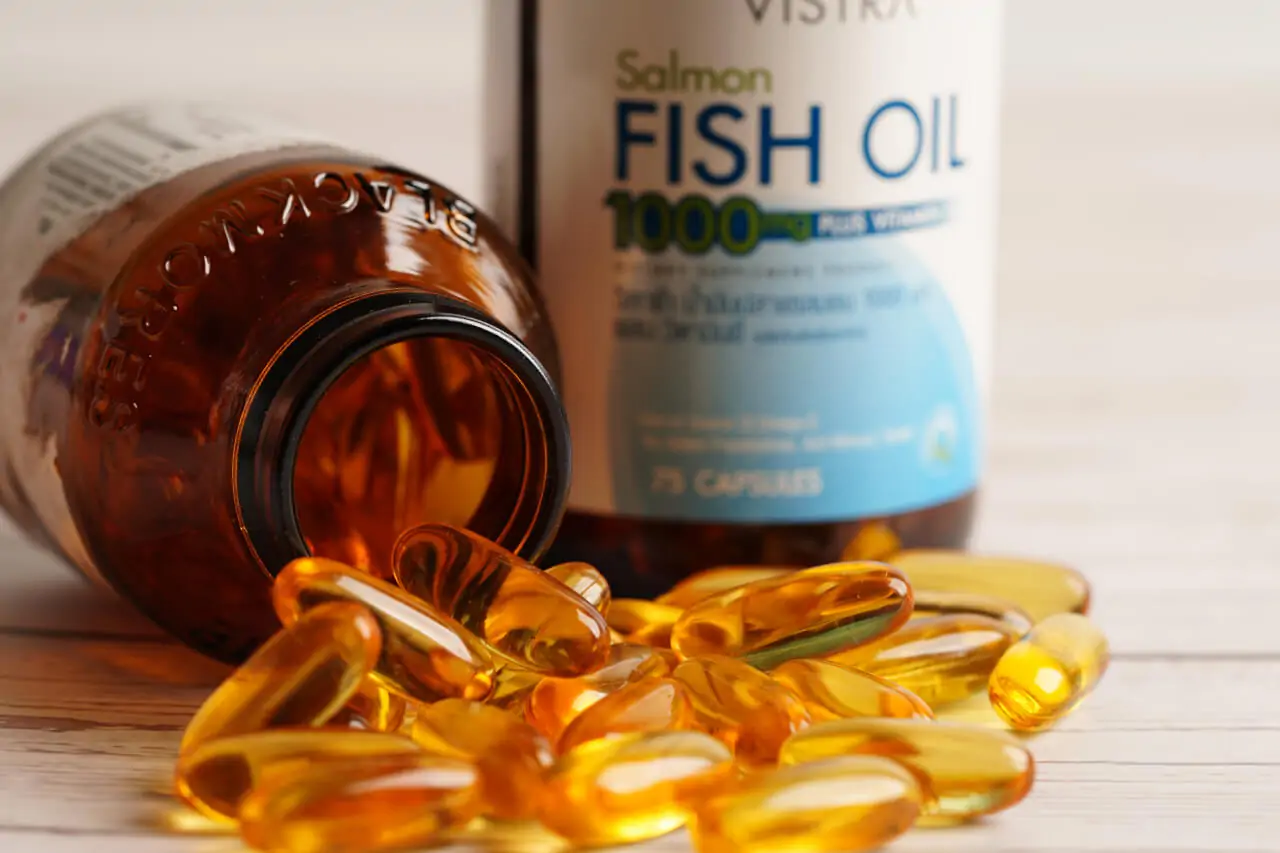Fish oil is a dietary supplement derived from the tissues of fatty fish, typically oily fish like mackerel, salmon, or sardines.
It is rich in omega-3 fatty acids, specifically eicosapentaenoic acid (EPA) and docosahexaenoic acid (DHA).
Fatty acids
Omega-3 fatty acids are a type of polyunsaturated fatty acids (PUFAs) that are essential nutrients for the human body.
There are three main types:
Eicosapentaenoic acid (EPA)
EPA is primarily found in fatty fish, such as salmon, mackerel, and sardines.
It is known for its anti-inflammatory properties and is believed to support heart health, reduce inflammation, and contribute to mental well-being.
Docosahexaenoic acid (DHA)
DHA is also abundant in fatty fish and is crucial for brain development and function.
It plays a vital role in the structure and functioning of the brain, as well as maintaining eye health, supporting cognition, and promoting overall neurological health.
Alpha-linolenic acid (ALA)
ALA is found in plant-based sources like flaxseeds, chia seeds, and walnuts.
The body can partially convert ALA into EPA and, to a lesser extent, DHA.
However, the conversion efficiency is relatively low, so consuming direct sources of EPA and DHA, such as fish or fish oil, is typically recommended for optimal intake.
Fatty acids are considered “essential” because the human body cannot produce them on its own, and they must be obtained through diet or supplementation.
Benefits of Fish Oil
Fish oil offers several potential benefits due to its high content of omega-3 fatty acids, particularly EPA and DHA.
Here are some of the potential benefits of fish oil:
Heart Health
Fatty acids found in fish oil may help reduce the risk of heart disease.
They can lower triglyceride levels, decrease blood pressure, reduce inflammation in blood vessels, and improve overall cardiovascular function.
Brain Health
DHA is a structural component of the brain and essential for its growth and function.
Consumption of fish oil may support cognitive function, promote memory, and contribute to a lower risk of cognitive decline and certain neurological disorders.
Inflammation Reduction
Omega-3 fatty acids possess anti-inflammatory properties, which can help reduce chronic inflammation in the body.
This may benefit individuals with inflammatory conditions such as rheumatoid arthritis, inflammatory bowel disease, and even asthma.
Eye Health
DHA is also highly concentrated in the retina of the eye and is important for maintaining vision and eye health.
Adequate intake of fatty acids, including through fish oil, may protect against age-related macular degeneration and dry eye syndrome.
Mental Well-being
Some studies suggest that fish oil consumption may have a positive impact on mental health.
It may help alleviate symptoms of depression, decrease anxiety, and improve overall mood and well-being.
Pregnancy and Infant Development
Fatty acids, especially DHA, are crucial during pregnancy as they support fetal brain and eye development.
Adequate intake of fish oil during pregnancy may contribute to healthy pregnancies and optimal infant development.
It’s important to note that while fish oil has potential health benefits, individual responses may vary.
Incorporate Omega 3 in Your Diet
Incorporating omega-3 fatty acids into your diet is essential for reaping their health benefits.
Here are some ways to ensure an adequate intake of omega-3:
Fatty Fish
Consume fish rich in omega-3 fatty acids, such as salmon, mackerel, sardines, trout, or herring.
Aim for at least two servings of fatty fish per week.
Grilling, baking, or steaming fish are healthier cooking methods compared to frying.
Fish Oil Supplements
Consider taking fish oil supplements, which are widely available in the form of capsules or soft gels.
Ensure that the supplements are from reputable sources and meet quality standards.
Consult a healthcare professional for appropriate dosage guidance.
Flaxseeds and Chia Seeds
Add flaxseeds or chia seeds to your meals or snacks.
These seeds are rich in alpha-linolenic acid (ALA), a type of omega-3 fatty acid.
Grind flaxseeds before consuming for better nutrient absorption.
Walnuts
Incorporate walnuts into your diet as a snack or add them to salads, yogurt, or oatmeal.
Walnuts are a good plant-based source of omega-3 fatty acids.
Leafy Greens
Consume leafy green vegetables like spinach, kale, and Brussels sprouts.
While they contain a more limited amount of omega-3s (ALA), they contribute to overall dietary balance.
Fortified Foods
Look for fortified foods like certain brands of eggs, milk, yogurt, or plant-based milk alternatives that are enriched with omega-3 fatty acids.
Omega-3 Enriched Products
Consider using omega-3 enriched cooking oils, spreads, or bread.
Ensure these products contain healthy sources such as flaxseed oil or algae oil.
Algae Supplements
Algae-based omega-3 supplements are made by cultivating specific types of algae in controlled environments.
This allows the algae to accumulate high levels of EPA and DHA.
The algae are then harvested and processed into supplements, usually in the form of capsules or soft gels.
These supplements are a viable alternative for individuals who prefer not to consume fish or fish oil due to dietary restrictions or personal preferences.
Algae supplements provide a sustainable and vegan-friendly source of fatty acids.
They can be found in health food stores or online, and it is advisable to choose verified and reputable brands to ensure quality and purity.
Tips for maintaining omega-3 healthy levels
Here are some tips for maintaining healthy levels of omega-3 fatty acids:
Incorporate fatty fish into your diet
Consuming fatty fish like salmon, mackerel, sardines, and trout a few times a week can provide a good source of fatty acids. Aim for at least two servings per week.
Include plant-based sources of omega-3s
If you follow a vegetarian or vegan diet or prefer plant-based options, incorporate sources of alpha-linolenic acid (ALA) such as flaxseeds, chia seeds, hemp seeds, and walnuts into your meals.
Consider fish oil supplementation
If you’re unable to consume enough omega-3-rich foods or have specific dietary restrictions, consider fish oil supplements.
Look for reputable brands that provide high-quality, molecularly distilled fish oil to ensure purity and potency.
Opt for fortified foods
Look for fortified foods like eggs, milk, yogurt, or spreads enriched with omega-3 fatty acids.
These fortified options can help boost your daily intake.
Be mindful of cooking techniques
When cooking fish, choose healthy cooking methods like grilling, baking, or steaming, which preserve the omega-3 content.
Deep frying or excessive heat exposure can lead to the degradation of these healthy fats.
Minimize omega-6 intake
Omega-6 fatty acids, found in processed and fried foods, soybean oil, and corn oil, can compete with omega-3s for the same enzymes in the body.
Aim to reduce the consumption of processed and fried foods while increasing omega-3-rich foods.
Read food labels
When shopping for packaged foods, check the labels for omega-3 content. Enhancing your intake.
Consult with a healthcare professional
If you have specific health concerns or are considering omega-3 supplementation, it’s always a good idea to consult with a healthcare professional.
Conclusion
Maintaining healthy levels of omega-3 fatty acids is crucial for overall well-being. Incorporating omega-3-rich foods like fatty fish, flaxseeds, chia seeds, and walnuts into your diet, along with considering fish oil supplementation or algae-based supplements, can help meet your omega-3 needs.
It’s important to be mindful of cooking techniques, choose healthy fats over unhealthy ones, and read food labels for omega-3 content.
Consulting with a healthcare professional or registered dietitian can provide personalized guidance and ensure you’re optimizing your omega-3 intake based on your specific needs.
By prioritizing fatty acids in your diet, you can support heart health, brain function, reduce inflammation, and promote overall wellness.
FAQs
What is omega-3 fatty acids?
Omega-3 fatty acids are essential polyunsaturated fatty acids that play vital roles in the body’s functions, including cardiovascular health, brain function, and inflammation regulation.
What are the main types of fatty acids?
The main types of omega-3 fatty acids are eicosapentaenoic acid (EPA), docosahexaenoic acid (DHA), and alpha-linolenic acid (ALA).
Where can I find EPA and DHA?
EPA and DHA are primarily found in fatty fish like salmon, mackerel, and sardines.
Fish oil supplements are also available as a convenient source.
What about vegetarians or vegans? How can they obtain fatty acids?
Vegetarians and vegans can obtain omega-3s from plant-based sources like flaxseeds, chia seeds, and walnuts, which provide alpha-linolenic acid (ALA).
However, conversion of ALA to EPA and DHA is limited, and supplementation may be recommended.
What are the benefits of omega-3 fatty acids?
Fatty acids have been associated with various health benefits, including supporting heart health, reducing inflammation, enhancing brain function, and aiding in fetal development during pregnancy.
Can omega-3 supplements be beneficial?
Yes, omega-3 supplements, such as fish oil capsules, can be beneficial, especially for individuals who do not consume sufficient amounts of fatty fish or have specific health conditions. Consultation with a healthcare professional is recommended for personalized advice.
Are there any potential side effects?
Generally, omega-3 supplements are safe for most individuals when taken within recommended doses.
However, high doses may increase the risk of bleeding for individuals on blood-thinning medications.
Consult with a healthcare professional to determine proper dosage and potential interactions.





